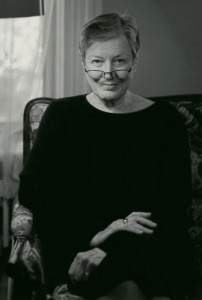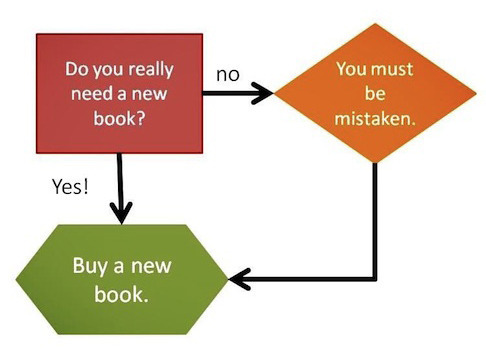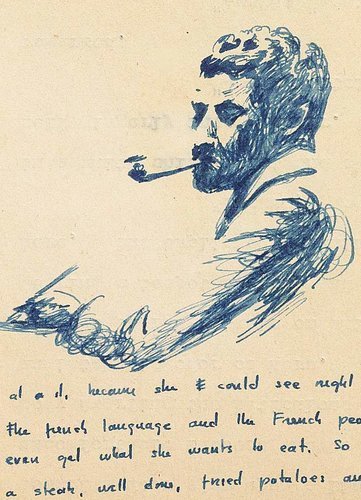The Paris Review's Blog, page 834
April 1, 2013
On the Occasion of the Removal of My Girlfriend’s Dog’s Balls
 Nine weeks ago, a frigid, low-pressure system deposited some six inches of snow on central Belgium. On a Tuesday evening my girlfriend returned from work to her parents’ house outside Brussels and attempted the construction of a snowman in the garden. The process was unsuccessful; it was very cold and the snow was dry powder, with none of the cohesive properties required for the manufacture of what the Flemish call a sneeuwman. Abandoning the original project, my girlfriend sat down on the submerged lawn. As her body reached this thrillingly accessible position her dog attempted to mount her, over and over again. He would not desist. Exasperated, my girlfriend made a decision she had long toyed with. She condemned his balls. Read More »
Nine weeks ago, a frigid, low-pressure system deposited some six inches of snow on central Belgium. On a Tuesday evening my girlfriend returned from work to her parents’ house outside Brussels and attempted the construction of a snowman in the garden. The process was unsuccessful; it was very cold and the snow was dry powder, with none of the cohesive properties required for the manufacture of what the Flemish call a sneeuwman. Abandoning the original project, my girlfriend sat down on the submerged lawn. As her body reached this thrillingly accessible position her dog attempted to mount her, over and over again. He would not desist. Exasperated, my girlfriend made a decision she had long toyed with. She condemned his balls. Read More »
The Old Order Changeth
Richard Griffiths, the revered character actor of stage and screen, died this week at sixty-five. While known for roles ranging from Hector in The History Boys to Vernon Dursley in Harry Potter, here at the Review, we will always have a place in our hearts for Withnail and I’s Uncle Monty, whom Griffiths managed to make one of the great comic—and tragic—figures of cinema.
Paula Fox, in Plain Sight
 This year our Spring Revel will take place on April 9. In anticipation of the event, the Daily is featuring a series of essays celebrating Paula Fox, who is being honored this year with The Paris Review’s Hadada Prize.
This year our Spring Revel will take place on April 9. In anticipation of the event, the Daily is featuring a series of essays celebrating Paula Fox, who is being honored this year with The Paris Review’s Hadada Prize.
In 1998, which now feels like a Triassically distant time, I was twenty-four years old and on the publishing make. Technically, I was an editorial assistant, but I was making bold, audacious, and sometimes highly presumptuous assistant editor moves. I had some call, mind you. W. W. Norton, the house that employed me, had encouraged me to come up with “ideas” for the paperback committee, which at the time felt like a huge honor. Correction: it was a huge honor. I had a few ideas, most of which, I was gently informed, stank. But one didn’t. This was the idea I had of republishing a thirty-year-old novel about a cat bite (and urban collapse, race relations, gentrification, and New York City) called Desperate Characters. Read More »
This Is Your Life on Books, and Other News
The book lover’s dilemma, via Rena Maguire.
Merriam-Webster’s is movin’ with the times, incorporating such newfangled phrases as the hideous bucket list, 2010-ish game changer, mysterious robocall, belated mashup, usefulcrowdsourcing, unfortunate cyberbullying, and inevitable viral.
If Marx lived today, speculates one biographer, “he would be a compulsive blogger, and picking Twitter fights with Andrew Sullivan and Naomi Klein.”
Speaking of! Celebrate Easter (belatedly) by testing your knowledge of resurrections in literature.
Genius in literature: a handy-dandy chart.
March 29, 2013
Christo, Untitled, 1982
Since 1964 The Paris Review has commissioned a series of prints and posters by major contemporary artists. Contributing artists have included Andy Warhol, Robert Rauschenberg, Helen Frankenthaler, Louise Bourgeois, Ed Ruscha, and William Bailey. Each print is published in an edition of sixty to two hundred, most of them signed and numbered by the artist. All have been made especially and exclusively for The Paris Review. Many are still available for purchase. Proceeds go to The Paris Review Foundation, established in 2000 to support The Paris Review.
The Private Lives of Web Journalists
Jason Novak works at a grocery store in Berkeley, California, and changes diapers in his spare time.
Paris Was Yesterday
This gallery of images of Paris, then and now, is completely mesmerizing. As they say, it is indeed a time machine.
What We’re Loving: Dancing Horses, Critical Fashion
For reasons I don’t begin to understand, Washington Irving’s Life of Oliver Goldsmith used to be required reading in American high schools. My own copy (1905) is a schoolbook edition, complete with suggestions for extra credit (“The teacher should know Thackeray’s English Humorists, D’Arblay’s Diary and Letters, Dobson’s Eighteenth Century Vignettes,” and four other books you’ve never heard of). It is hard to believe that such a fascinating biography was ever taught to kids. What did they care about the economics of Grub Street, or the incredible elegance with which writers once knew how to break a contract? Irving and Goldsmith both did plenty of hack work—a term Irving uses without prejudice—but this is clearly a labor of love and obsession. And it’s that rare thing in literary history: a penetrating essay by a great humorist, whose work is still just within our reach, about another who stands outside the pale. —Lorin Stein
For many of us, fashion is a tricky thing: while both the way people choose to dress themselves and the art form are fascinating, the intersection can be, to say the least, problematic. Enter Fashion Projects, a journal devoted to critical discourse in fashion. If that sounds oxymoronic, try issue 4, out now: an interview with Judith Thurman, Jay Ruttenberg on Bill Cunningham, and fashion criticism as political critique are just a few things it takes on. —Sadie Stein Read More »
Faulkner Nobel on the Block, and Other News
“The largest and most important group of William Faulkner material ever to appear at auction”—including his Nobel medal, an unpublished short story, and illustrated letters, recently found at the Faulkner home—is expected to fetch at least $2 million at Sotheby’s come June.
Here is a sweet library marriage proposal for you. (To read, that is.)
In further library human-interest, Flavorwire rounds up nifty librarians from around the country. (Just a small sampling, of course.)
Now for something completely different: the all-seeing eye that is Amazon.com is acquiring Goodreads for an undisclosed sum.
March 28, 2013
Everything They Cook Takes Five Hours: An Interview with Director Alexa Karolinski
Alexa Karolinski is an old friend. I first met her in 2005, when I was the editor at VICE Italy, in Milan, and she was a particularly bright intern at the VICE Germany office. Alexa quit VICE a few months after I met her; she then moved to Paris for a while, started working in television for ARTE, met her husband, moved back to Berlin, and then moved to New York three years ago, where she studied documentary filmmaking at the School of Visual Arts. And now she is a film director. Oma & Bella, her first feature-length film, began as her thesis, and was then released in German cinemas after being accepted at the Berlin Film Festival last year. If, like me, you have any sort of fascination with World War II, food, and your grandma, it is an absolutely must-see documentary.
Oma & Bella tells the story of best friends Bella Katz and Regina Karolinski (Alexa’s grandmother), two octogenarian Holocaust survivors amongst the oldest surviving members of Berlin’s Jewish community, who moved in together when Regina had a hip operation. They spend most of their time cooking traditional Eastern European Jewish food, giving that food to their family, talking about food, organizing dinners, going food shopping, preparing food, washing the utensils they use to prepare food, putting food in Tupperware and freezing it, and occasionally taking a break from the food in the form of an amble to the park or the cemetery. With a delicate grace and a warm sense of humor, Alexa made one of the most touching portraits of an elderly couple―and of Holocaust survivors―I have ever seen on screen.
A few months after the movie was released, we collaborated on The Oma & Bella Cookbook. That is to say: when Alexa told me she wanted to make a cookbook that would collect the movie’s recipes, I begged her to let the Milan Review design it.
I recently got on Skype with Alexa to talk about her movie, grandparents, and food.
So, tell me—exactly when did you decide to make this movie?
It began about three years ago, when I was living in Berlin and decided that I wanted to learn how to cook. At the time I couldn’t cook anything more complicated than scrambled eggs and I decided that one day, my children—the children I don’t have yet—should be able to eat the food I grew up with. Therefore, I needed to learn that from my grandmother, and from her best friend, Bella, who she lives with. So I started cooking with them and then I kind of decided very quickly that it wasn’t enough to just cook with them, that I would have needed to write down the recipes and make a cookbook out of it.
It must have been daunting.
Yes. And they don’t cook with measurements—they go by eye—so I had to learn how to cook with them and invent the measurements just by watching them cook. So basically I started this cookbook project, and within that cookbook project I was looking for a visual landscape. And one day I kind of decided, knowing that I was going to go back to film school, to rent a camera and, just for fun, film them. Then I cut a two-minute teaser out of that, just to teach myself how to use Final Cut. And then, when I moved to New York, I showed this around, mostly just to show some friends how much I love my grandmother and how amazing she is. And people were like, This is gonna be your thesis film, and I kind of thought, Yeah, I guess it is. Read More »
The Paris Review's Blog
- The Paris Review's profile
- 305 followers










